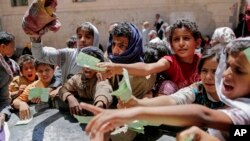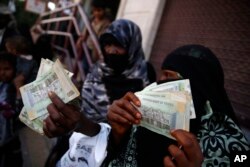Yemen's tanking economy threatens to kill more people than bombs and guns, an aid agency warned on Tuesday as the currency hit its lowest level ever, compounding the world's biggest hunger crisis.
The Norwegian Refugee Council (NRC) said soaring food prices were pushing many people closer to the brink in a country where millions are already close to famine.
"This economic collapse could kill even more Yemenis than the violence underlying it," NRC's Yemen country director Mohamed Abdi said, adding that food prices in some places had doubled in recent days.
"The situation is terrible. If something is not done it is only going to get worse," he told Reuters by phone.
The Yemeni rial was exchanging at 630 to the dollar in the port city of Aden on Monday, according to the NRC, up from less than 250 at the beginning of the conflict in 2015.
Protests over the economy, which erupted in Aden on Sunday, were continuing Tuesday, Abdi said.
Three-quarters of Yemen's population — 22 million people — are in need of humanitarian assistance.
More than 28,000 people have been killed or wounded during the war and 3 million have been uprooted, according to United Nations officials. Thousands more have died from malnutrition, disease and poor health.
The war pits the government of President Abd-Rabbu Mansour Hadi, based in the south and backed by Saudi Arabia, against the Iran-aligned Houthi movement that controls the north including the capital Sanaa.
"Even buying an egg is very expensive now," the NRC quoted one woman in the port city of Hodeida as saying.
"Before we would spare what we could to help beggars in the streets, but now we have nothing left to offer."
Abdi said it was "heartbreaking" to see civil servants who have not been paid for two years reduced to begging in order to feed their families.
The World Food Program (WFP) says 8.4 million people are "precariously close to famine."
WFP's Yemen representative Stephen Anderson said there had been a dramatic increase in severe hunger in the last year as food prices rose and jobs dried up.
"Yemen is in free fall. We are extremely worried about the worsening economic conditions," he told Reuters.
He said the WFP and aid agencies were targeting the people closest to famine, but there were another 10 million people who were going hungry and not getting help.
"Our concern is that if prices continue to rise, it will tip more people into severe hunger," Anderson said.






